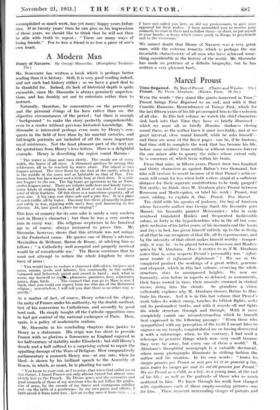A Modern Man
:411. SLOCOMBE has written a book which is perhaps better reading than it is history. Still, it is very good reading indeed, and not such had history either ; so we have a good deal to be thankful for. . Indeed, its lack of historical depth is quite excusable, since Mr. Slocombe is always genuinely unpreten- tious, and has frankly set out to entertain rather than to
instruct.
• Naturally, therefore, he concentrates on the personality and the personal doings of his hero rather than on the objective circumstances of the period ; but there is enough background " to make the story perfectly comprehensible, even to a reader without previous historical knowledge. Mr. Slocombe is interested perhaps even more by Henry's con-, quests in the field of love than by his martial victories, and full-length portraits are inclitded of all the more important royal mistresses. Not the least pleasant part . of the text are the quotations from Henry's love letters. Here is a delightful example. Henry is describing the region round Marans : •
" The water is clean and runs slowly. The canals are of every Width, the boats of all sizes. A thousand gardens lie among this wilderness, all to be reached by water alone. The island is two leagues around. The river flows by the foot of the castle, which is in the middle of the town and as habitable as that of Pau. Few houses here but have water and a little boat at their door. It is only two leagues to the sea. The big boats go upstream as far as Niort, twelve leagues away. There are infinite mills here and lonely farms ; litany kinds of singing birds and all kind of sea-fowl—I send you none of their feathers. Of fish there is a monstrous quantity, all of great size. A big carp cost three cols and a pike five. It is a place of much traffic, all by water. One may live there pleasantly in peace and safely in war, rejoicing with one's love and lamenting in her absence. Ah, how.good a place for singing ! "
This love of country for its own sake is surely a very modern trait in Henry's character ; but then he was a very modern nein in every way. His religious scepticism in his fanatical age is, of course, always instanced to prove this. Mr. Skicombe, however, shows that this attitude was not unique in the Protestant cause. He quotes one of Henry's advisers, Maximilien de Bethune, Baron de Rosny, a% advising him as follows : a Catholicity well accepted and properly received would be of considerable use." The Baron continues that he must not attempt to reduce the whole kingdom by sheer force of arms : " You would have to endure a thousand difficulties, fatigues and pains, ennuis, perils and labours, live continually in the saddle, cuirassed and helmeted, pistol and sword in hand ; and, what is worse, say farewell to repabe, pleasures, pastimes, love, mistresses, games, dogs, birds. . . .. The counsel that you go to Mass is one, I think, that you could not expect from me who am of the Reformed religion ; nevertheless, I will tell you that there is no other way so speedy."
As a matter of fact, of course, Henry achieved his object, the unity of France under his authority, by the double method, first of his conversion to Catholicism, and secondly by good hard cash. He simply bought off the Catholic opposition once he had got control of the national exchequer of Paris. Here, again, is a policy of modernistic realism.
Mr. Slocombe in his concluding chapters does justice to Henry as a statesman. His reign was too short to provide France with so glorious a florescence as England enjoyed in her half-century of stability under Elizabeth ; but still Henry's decade and a half sufficed to a surprising extent to repair the appalling damage of the Wars of Religion. How comparatively parliamentary a monarch Henry was—at any rate, when he liked—is shown by his brilliant speech to the Assembly at Rouen, in which, as usual, he is pleading for cash : •
" You know to your cost, as I to mine, that when God called me to
this throne, I found France not only almost ruined but almost com- pletely lost to the French. By Divine grace and the entreaties and goodeounsels of those of my servitors who do not follow the profes- sion of arms, by the swords of my brave and courageous nobility and—on the faith of a gentleman—by my own pains and efforts, I have saved kJ:ram total 19.5s, J..et us to..day says it from.
I have aot.ealled you here, as did my predecessors, to gain your approval 'for their wishes. I have assembled you to receive your counseli, to trust in them and to follow them-in short, to put myself in your hands—a desire which comes rarely to Kings, to greybeards and to the victorious."
We cannot doubt that Henry of Navarre was a very great man, with the extreme tenacity which is perhaps the one invariable characteristic of all men who have achieved some- thing considerable in the history of the world. Mr. Slocombe has made no pretence at a definite biography, but he ha$ written a very pleasant book.
































































 Previous page
Previous page